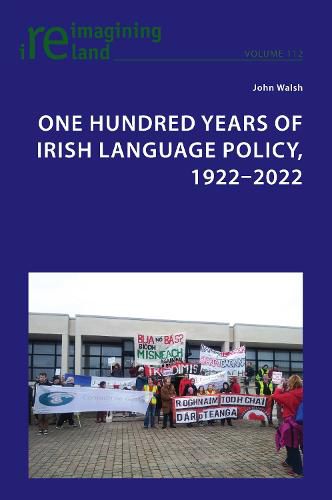Readings Newsletter
Become a Readings Member to make your shopping experience even easier.
Sign in or sign up for free!
You’re not far away from qualifying for FREE standard shipping within Australia
You’ve qualified for FREE standard shipping within Australia
The cart is loading…






This title is printed to order. This book may have been self-published. If so, we cannot guarantee the quality of the content. In the main most books will have gone through the editing process however some may not. We therefore suggest that you be aware of this before ordering this book. If in doubt check either the author or publisher’s details as we are unable to accept any returns unless they are faulty. Please contact us if you have any questions.
Following the significant advance of English in Ireland during the 18th century, the restoration of Irish as the vernacular language formed a key part of a broad cultural Revival movement from the late 19th century. Many of those who fought figuratively or literally for independence learned Irish to varying degrees of success or broadly supported the aims of the Revival movement. Significant policy measures to promote Irish were adopted following independence in 1922, particularly in the fields of education, legal status and public administration. Despite decades of contestation around revitalisation, Irish continues to enjoy institutional supports denied to many other European minority languages but remains weak as a community language.
Published in the centenary year of the foundation of the Irish state, this book reviews one hundred years of government policy on Irish and assesses its relative success or failure. Based on theoretical perspectives on language policy and revitalisation of minority languages, it analyses the development and implementation of Irish language initiatives in five thematic areas: speakers, the Gaeltacht, education, legislation and broadcasting. Each chapter includes an overview of the topic and a detailed case study on an aspect of it, drawing heavily on archival sources related to both the state and civil society organisations.
$9.00 standard shipping within Australia
FREE standard shipping within Australia for orders over $100.00
Express & International shipping calculated at checkout
This title is printed to order. This book may have been self-published. If so, we cannot guarantee the quality of the content. In the main most books will have gone through the editing process however some may not. We therefore suggest that you be aware of this before ordering this book. If in doubt check either the author or publisher’s details as we are unable to accept any returns unless they are faulty. Please contact us if you have any questions.
Following the significant advance of English in Ireland during the 18th century, the restoration of Irish as the vernacular language formed a key part of a broad cultural Revival movement from the late 19th century. Many of those who fought figuratively or literally for independence learned Irish to varying degrees of success or broadly supported the aims of the Revival movement. Significant policy measures to promote Irish were adopted following independence in 1922, particularly in the fields of education, legal status and public administration. Despite decades of contestation around revitalisation, Irish continues to enjoy institutional supports denied to many other European minority languages but remains weak as a community language.
Published in the centenary year of the foundation of the Irish state, this book reviews one hundred years of government policy on Irish and assesses its relative success or failure. Based on theoretical perspectives on language policy and revitalisation of minority languages, it analyses the development and implementation of Irish language initiatives in five thematic areas: speakers, the Gaeltacht, education, legislation and broadcasting. Each chapter includes an overview of the topic and a detailed case study on an aspect of it, drawing heavily on archival sources related to both the state and civil society organisations.